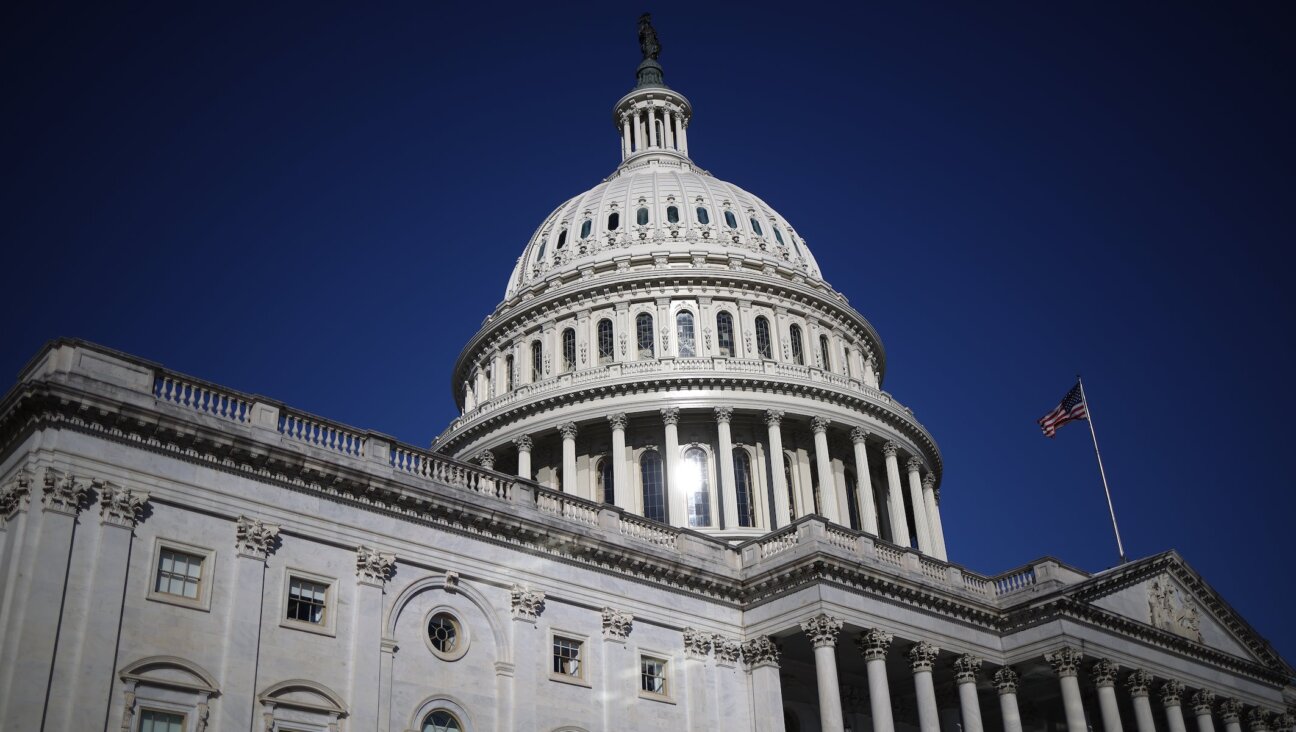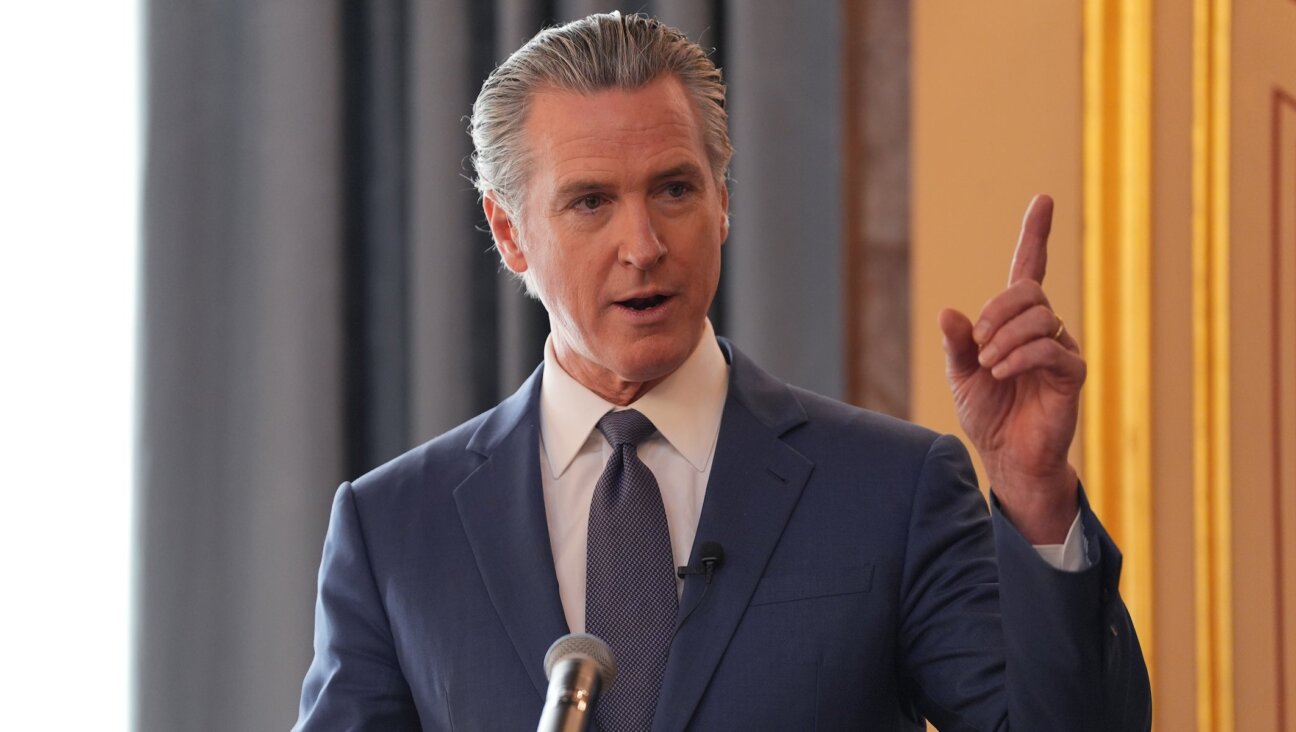Standing Again With Lilith; The Long and Winding Roads of Jewish Feminism
These days, everyone is post-something: postmodern, post-Zionist — and, in many quarters, post-feminist. Like other “revolutionary” ideologies, feminism has come to mean different — indeed, diametrically opposed — things to different people. To some, it is the simple belief that women should be treated as equal to men: for example, that they should not be paid 76 cents for every dollar earned by a similarly employed, educated and skilled man (as is currently the case in America). To others, it is the opposite: not that women should be treated the same as men, but that their “different voices” should be honored and included. To some, feminism is evolution; to others, for better or for worse, it’s revolution.
Judith Plaskow has been at the center of the Jewish feminist movement since it began, and her new anthology of essays, “The Coming of Lilith: Essays on Feminism, Judaism, and Sexual Ethics, 1973-2003” (Beacon Press), reads in part like a travelogue of feminism’s long, strange trip through the activist days of the 1960s, the heady years of 1970s social theory, the setbacks of the 1980s and the “post-feminist” period of the past two decades. The book’s introduction is quite specific about when Plaskow’s journey began. As she writes, “I became a feminist in the fall of 1969,” after attending a meeting of female graduate students at Yale. “Very few of us were feminists; I certainly wasn’t… [but] as I began to connect my own personal history as a girl who had always been ‘too smart’ with my new understandings of women’s socialization and social roles, my whole way of looking at the world began to shift.”
Plaskow then took what she calls a “small step,” linking her burgeoning feminism with her academic work in theology. It would turn out to be more like a giant leap. Beginning in 1972, with the essay/midrash called “The Coming of Lilith,” and culminating in the 1990 volume “Standing Again at Sinai,” Plaskow charted a new, and often radical, path in Jewish theology. Hers is not an agenda of small change. In Plaskow’s view, Jewish theology, law and culture are shot through with bias. As she told the Forward, “You have to acknowledge the extent to which women have been excluded from the 3,500 year conversation through which Jewish tradition has been created. This affects every aspect of tradition — how we define what’s Jewish, what we think of as Torah, the development of halakha, our images of God, our sexual ethics, and so on. Genuine equality means being open to the gradual transformation of all these aspects of tradition.” Plaskow disagrees with those who advocate working within the traditional system to effect change. “If you accept a framework that marginalizes you in its fundamental rules and perspectives,” she asks, “how can you think you will ever be a full and equal participant in the system?”
What all this means in terms of tachles (practical consequences) has evolved over time. The first step was, and remains, waking up: noticing the relative lack of women’s voices in Jewish tradition, and how that tradition talks about God in ways that reflect certain perspectives more than others. As feminism developed, this “consciousness-raising” was followed by innovations such as feminine God language (which often rankles even nontraditionalists today) and the questioning of gender roles in Jewish life. Gradually, a whole new literature of midrash, ritual, legal opinion, visual art, poetry and textual interpretation was created by women such as Susanna Heschel, Avivah Zornberg, Marge Piercy, Blu Greenberg, Plaskow herself, Anita Diamant, Merle Feld, Alicia Ostriker, and rabbis Judith Hauptmann, Jill Hammer, Marcia Prager and Phyllis Berman, among many others.
Today, the range of women involved in Jewish feminism is wide. Some, in increasing numbers, are recovering practices that an earlier generation of feminists once scorned, even returning to the structures of Orthodoxy. At the other end of the spectrum, many women (and men, as in Ohad Ezrachi and Mordechai Gafni’s new Hebrew book, “Who’s Afraid of Lilith?”) have called for “the coming of Lilith” in even more explicit terms than Plaskow has, using the legendary first wife of Adam as a symbol for the suppressed feminine spirit, the denigrated “shadow side” of human personality, even the exiled goddess. These pioneers have created Earth-based, feminist and embodied liturgy and rituals that some have derided — and others celebrated — as Jewish paganism. (Plaskow’s 1991 essay, “Jewish Anti-Paganism,” addresses some of these critiques.) Between these poles, many women are re-appropriating traditional rituals while transforming them. For example, Living Waters Community Mikvah, located in Newton, Mass., is a traditional structure, in some ways, but was created by women less interested in laws of “family purity” than in the primal power of water to heal, restore and renew the soul.
As a result of this diversity, some of Plaskow’s earlier ideas have come under critique. As Plaskow notes in the book’s introduction, essays such as “Male Theology and the Experience of Women” seem to suppose that there is a single notion of “women’s experience,” a supposition that has come to be seen as reductionist and essentialist. When Plaskow speaks of “the need to expand the definition of spirituality to incorporate women’s experience” (“Jewish Theology in Feminist Perspective,” 1994), which kinds of “experience” count?
Still, one of the great values of “The Coming of Lilith” is that is serves as a reminder of how far Jewish feminism has come, and how — for all its supposed radicalism — some of its initial advances are now commonplace. As Plaskow asks in “Expanding the Jewish Feminist Agenda” (2000), “Thirty years ago, who could have anticipated that, at the turn of the century, there would be hundreds of female rabbis representing three Jewish denominations, untold numbers of female Torah and Haftorah readers, and female cantors and service leaders in synagogues throughout the country? Who could have imagined that so many girls would expect a full bat mitzvah as a matter of course, or that Orthodox women would be learning Talmud, mastering synagogue skills, and functioning as full participants in services of their own?”
In recent years, Plaskow has turned her attention to issues of sexuality, as it relates both to women and to sexual minorities (Plaskow is both; she came out as a lesbian in the 1980s). As these issues are extremely controversial today — as evidenced by last month’s stabbing of three marchers in the Jerusalem Gay Pride parade by an ultra-Orthodox protester — Plaskow’s critique seems timely. Like her feminist theory, it is a radical alternative to the sometimes-tortured efforts of contemporary rabbis to make respect for sexual minorities fit within traditional Jewish law. Plaskow criticizes the structure as a whole. She observes that, contrary to today’s discourse about sexual “morality,” the prohibitions in Leviticus are part of a holiness code concerned not with morality but with pollution, written “not in the language of right and wrong, but of abhorrence and defilement.” Thus, Plaskow says, a feminist rereading of these tribal-sounding prohibitions, related to beliefs around women’s menstrual blood and other bodily fluids, “involves importing a set of assumptions radically different from those of the text,” priorities based on ethics rather than on fears of pollution, on social structures rather than on magic. The result is less a creative reading of Leviticus than a questioning of how we ought to relate to it as a whole.
As in her earlier work, this critique of Jewish tradition, and “recovery” of its marginalized voices, will strike some readers as refreshing, others as heretical. Yet this is Plaskow’s project — in her words, “to confront the ways in which aspects of Jewish tradition have been exclusionary and destructive, and the ways in which contemporary Jews can take the power to shape them in new directions.” “The Coming of Lilith” is an excellent introduction to some of the fruits of that effort, and, if the past is any guide, how unexpected its future results may be.
Jay Michaelson will be teaching “Ecstatic, Embodied, Earth-Based, Energetic: An Introduction to Holistic Jewish Ritual” in September at the Elat Chayyim Jewish Spiritual Retreat Center.

















